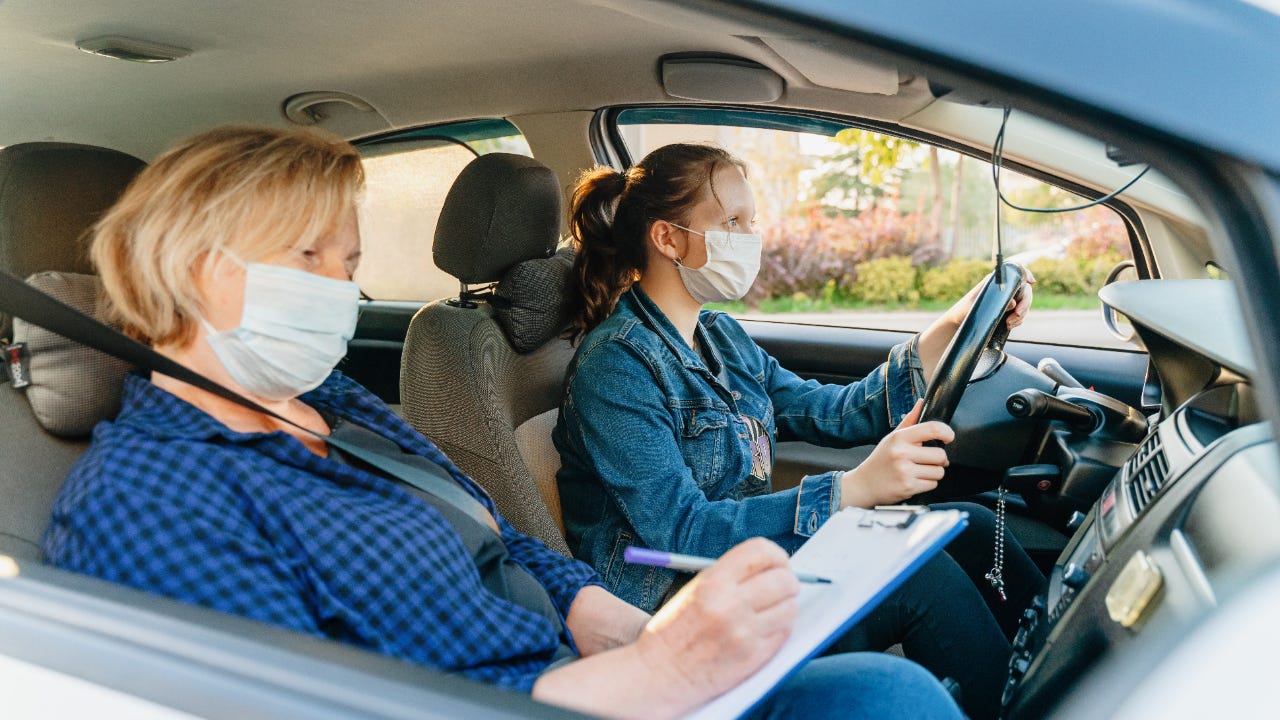New Drivers and COVID-19

The Bankrate promise
At Bankrate, we strive to help you make smarter financial decisions. To help readers understand how insurance affects their finances, we have licensed insurance professionals on staff who have spent a combined 47 years in the auto, home and life insurance industries. While we adhere to strict , this post may contain references to products from our partners. Here's an explanation of . Our content is backed by Coverage.com, LLC, a licensed entity (NPN: 19966249). For more information, please see our .
Getting a driver’s license is a rite of passage for many teenagers. To prepare for the on-road test, most student drivers are required to complete a driver’s education course and practice on-road skills with a licensed instructor. But with the COVID-19 pandemic, some in-person driver’s education programs and on-road tests have been put on hold.
COVID-19 has changed the process for completing a driver’s education program and obtaining a driver’s license at the DMV. With social distancing regulations and business shutdowns, teen drivers and their parents are now learning how to navigate the new system. Fortunately, state governments and driver’s ed businesses are finding ways for drivers to get their license safely.
How COVID-19 is impacting driver’s licenses and new driver education
In a traditional driver’s education program, the student and the instructor sit in the vehicle together for several hours, but that is no longer happening in many cases. As an alternative, some driving schools are now offering virtual programs to limit physical contact.
Drivers should also be aware that most state DMVs have COVID-19 restrictions. The new rules vary by location, but in most states, drivers must make an appointment for their on-road test. Certain states are using modified on-road tests, and in some places, the behind-the-wheel test is no longer required during the pandemic.
The new changes are designed to keep everyone safe. However, these disruptions are causing financial strain for new drivers and driver’s ed businesses. Teens are eager to get their driver’s license, and driving schools are hoping to bring in revenue. Drivers should expect temporary changes to remain in place until the COVID-19 vaccine is widely distributed.
What is the protocol for getting a license and driver’s education in my state?
Every state is following a different process for issuing driver’s licenses during the COVID-19 pandemic. Here are the current driver’s license protocols in all 50 states:
| State | License requirements |
| Alabama | Some DMV locations are open and others are providing services via phone; Drivers should check to see if their closest location is open and make an appointment. |
| Alaska | Drivers must make an appointment for an on-road driver’s license test. Alaska is using a modified on-road test. Drivers take the test alone, and cameras are placed around the outside of the car to track the driver’s performance. A licensed driver over 21 must be in the vehicle during the test. |
| Arizona | Drivers must make an appointment for an on-road test. DMVs are only open for essential services. |
| Arkansas | Certain DMVs are open and scheduling on-road tests by appointment only. |
| California | Certain DMVs are open and scheduling on-road tests. Learner’s permits are extended six months from the expiration date. |
| Colorado | DMVs are open and scheduling on-road tests by appointment only. |
| Connecticut | DMVs are open and scheduling on-road tests by appointment only. |
| Delaware | DMVs are open and scheduling on-road tests by appointment only. |
| Florida | DMVs are open for limited services and are scheduling on-road tests by appointment only. |
| Georgia | DMVs are open and scheduling on-road tests by appointment only. |
| Hawaii | DMVs are open and scheduling on-road tests by appointment only. During the on-road test, drivers must turn off the air conditioner and roll down all windows in the vehicle. Learner’s permits are extended six months from the expiration date. |
| Idaho | DMVs are open and scheduling on-road tests by appointment only. Drivers should visit their county’s DMV website to make an appointment. |
| Illinois | DMVs are open and scheduling on-road tests by appointment only. |
| Indiana | BMVs are open and scheduling on-road tests by appointment only. Drivers must schedule an appointment at least 48 hours and a maximum of 3 weeks in advance. |
| Iowa | Driver’s education is being offered through virtual instruction only. Drivers can obtain their license at a DMV by making an appointment. |
| Kansas | DMVs are open and scheduling on-road tests by appointment only. |
| Kentucky | Driver’s education is being offered through virtual instruction only. Most DMV locations are open and scheduling on-road tests by appointment only. |
| Louisiana | Most OMV locations are open. Drivers can schedule an on-road test appointment or walk-in to an open location, pending availability. |
| Maine | Drivers must mail a road test request card to the main BMV office at 29 State House Station, Augusta, Maine 04333-0029. The driver will receive a notification of their test appointment and location. |
| Maryland | MVAs are open and scheduling on-road tests by appointment only. |
| Massachusetts | RMVs are open and scheduling on-road tests by appointment only. On-road tests are conducted in state vehicles for the time being. In-person driver’s ed is available with limited capacity. |
| Michigan | DMVs are open and scheduling on-road tests by appointment only in certain offices. |
| Minnesota | Driver’s ed programs are operating virtually and in-person with limited capacity. Driver’s can make an appointment at an authorized DMV office to take the on-road test. |
| Mississippi | On-road tests have been temporarily waived during COVID-19. The driver must have a driving log with at least 50 hours of behind the wheel training. Drivers are required to sign an Affidavit in order to obtain their license. |
| Missouri | Certain DMVs are open and scheduling on-road tests. Learner’s permits are extended six months from the expiration date. |
| Montana | DMVs are open and scheduling on-road tests. |
| Nebraska | DMVs are open and scheduling on-road tests. |
| Nevada | DMVs are open and scheduling on-road tests. |
| New Hampshire | DMVs are open and scheduling on-road tests. |
| New Jersey | DMVs are open and scheduling on-road tests. |
| New Mexico | The DMV is currently not processing any on-road tests. Drivers are required to wait until on-road testing restarts to make an appointment. |
| New York | DMVs are open and scheduling on-road tests by appointment only. Drivers are required to disinfect the passenger side of the vehicle with wipes provided by the DMV upon arrival. |
| North Carolina | On-road tests have been temporarily waived during COVID-19. The driver must have a driving log with at least 60 hours of behind the wheel driving, and at least 10 hours of nighttime driving. A supervising driver must sign the log when it is submitted. |
| North Dakota | DMVs are open and scheduling on-road tests. |
| Ohio | DMVs are open and scheduling on-road tests. |
| Oklahoma | DMVs are open and scheduling on-road tests. |
| Oregon | Select DMVs are open and scheduling on-road tests. Drivers also have the option to take the on-road test through an approved private business. |
| Pennsylvania | Drivers can schedule an on-road test at a Driver License Center. Drivers also have the option to take the on-road test through a third-party non-commercial testing site. The on-road tests are modified and currently take place in a controlled testing environment to limit exposure. |
| Rhode Island | The Cranston and Providence DMV locations are open for on-road testing, by appointment only. Tests are taken on a closed course near the DMV. |
| South Carolina | DMVs are open and scheduling on-road tests. |
| South Dakota | DMVs are open and scheduling on-road tests. |
| Tennessee | DMVs are open and scheduling on-road tests. |
| Texas | DMVs are open and scheduling on-road tests
by appointment only. |
| Utah | DMVs are open and scheduling on-road tests by appointment only. |
| Vermont | Certain DMVs are open and scheduling on-road tests by appointment only. |
| Virginia | Certain DMVs are open and scheduling on-road tests. Learner’s permits are extended six months from the expiration date. |
| West Virginia | DMVs are open and scheduling on-road tests by appointment only. |
| Washington | DMVs are open and scheduling on-road tests by appointment only. |
| Wisconsin | On-road tests have been temporarily waived during COVID-19. Drivers must have at least 30 hours of driver’s education and 30 hours of behind-the-wheel training with a licensed driver. |
| Wyoming | DMVs are open and scheduling on-road tests by appointment only. |
How to save on new driver insurance premiums during COVID-19
In the United States, the average cost of full coverage car insurance is $1,738 per year. However, new drivers typically pay the highest insurance premiums because of their lack of experience. Other factors like state, gender, the amount of coverage and the policy’s deductible can impact a teen’s car insurance rate.
When parents add a teen driver to their car insurance policy, their premium can increase by as much as 130%. But there are ways to get cheap car insurance. Buying a safe vehicle, being a good student, paying the annual premium in full and taking a defensive driving course can help new drivers save money on insurance.
Bottom line
- New drivers are still able to get their license in most states, but the rules vary.
- Some states are waiving the on-road test to limit the spread of COVID-19.
- Drivers should contact their state’s DMV to make an on-road test appointment where available.
- Teen drivers pay high car insurance premiums, but there are ways to save money.
Related Articles



